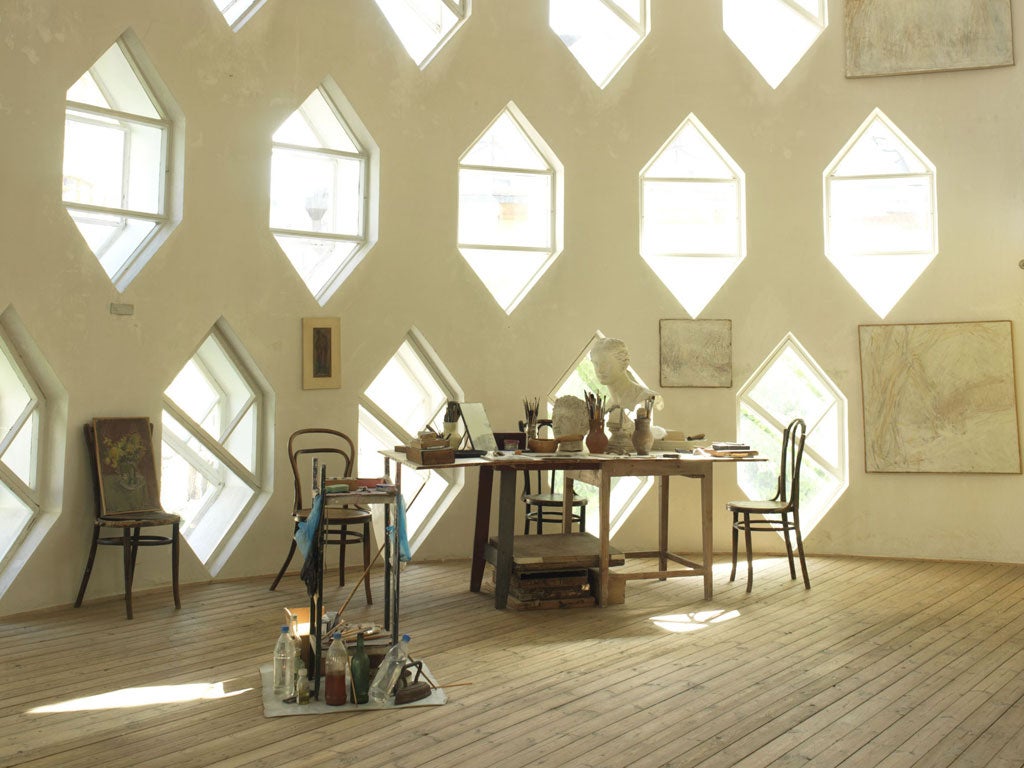Moscow's art house goes to ruin
A bitter family row is preventing an iconic piece of Russian architecture from being restored

Your support helps us to tell the story
From reproductive rights to climate change to Big Tech, The Independent is on the ground when the story is developing. Whether it's investigating the financials of Elon Musk's pro-Trump PAC or producing our latest documentary, 'The A Word', which shines a light on the American women fighting for reproductive rights, we know how important it is to parse out the facts from the messaging.
At such a critical moment in US history, we need reporters on the ground. Your donation allows us to keep sending journalists to speak to both sides of the story.
The Independent is trusted by Americans across the entire political spectrum. And unlike many other quality news outlets, we choose not to lock Americans out of our reporting and analysis with paywalls. We believe quality journalism should be available to everyone, paid for by those who can afford it.
Your support makes all the difference.Its foundations shaken and its walls furrowed with cracks, one of Moscow's most iconic buildings is in danger of collapse.
The Melnikov House, one of the most remarkable legacies of Constructivism – the early-Soviet architectural movement – has been at the centre of a bitter dispute for years, and with no resolution in sight, preservationists fear that time to save the building is running out.
Built in 1929 by Konstantin Melnikov, a leading light of the Constructivist movement, as a residence and a studio, the extraordinary cylindrical building is located just off Arbat Street in central Moscow. Later, it was inhabited by Melnikov's son, Viktor, a well-known artist who had his studio in the building.
The house is still inhabited by Viktor's daughter, Ekaterina Karinskaya. Ever since Viktor died in 2006, there have been plans to turn the building into a museum, but a family dispute involving Ms Karinskaya, her sister, the Moscow government and a multi-millionaire has meant that no progress has been made.
Preservationists say a nearby construction site has caused the foundations of the Melnikov House to be put in danger. Ms Karinskaya says that when work takes place on the site she can literally see the ground move outside.
This winter the house also went 50 days without heating. Melnikov designed a unique heating system whereby hot water pipes below the house push hot air up through the building. The pipes were in need of repair, and when The Independent visited the house last week, the temperature inside was seven degrees. "It is a total nightmare for the house," says Ms Karinskaya. "All the interiors are wooden, it is going to destroy everything."
She wrote to the Mayor of Moscow and even to President Vladimir Putin about the heating and the construction, but has received no replies.
"It's shocking that the situation has been left to get to this stage," says Clementine Cecil, one of the founders of the Moscow Architecture Preservation Society. "It's one of Moscow's most important buildings. Constructivism is generally considered the best architectural period that Russia has ever produced, and Melnikov is one of the most important 20th-century architects."
When leading international architects visit Moscow, the Melnikov House is up there with the Kremlin on the must-visit list. It is an extraordinary structure, its circular rooms bathed in light that streams through rhombus-shaped windows.
Melnikov designed a number of well-known buildings in Moscow, most of which fell into decay as the Constructivist style went out of fashion under Joseph Stalin, when experimental architecture was abandoned.
While remaining famous globally and taught in architecture courses around the world, Constructivism was neglected in Russia until a few years ago, when there was a revival of interest in the style.
The Bakhmetevsky Bus Depot, another building designed by Melnikov in the 1920s, was renovated and opened in 2008 as Garazh, a contemporary art museum run by Dasha Zhukova, Roman Abramovich's girlfriend. Garazh has now moved out and the building re-opened this month as a Jewish Museum.
Viktor Melnikov's will decreed that the house should become a museum, but he split it between his daughters, and on his death, one half of the house was purchased by Sergey Gordeyev, a mysterious Russian property developer who made a fortune in the 1990s.
Ms Karinskaya calls Mr Gordeyev a "raider", referring to the common practice of corporate raiding in the ruthless Moscow business world, through which Mr Gordeyev is believed to have made his fortune.
At the time he bought it, there were suspicions that he simply wanted to own the house because of the prize real estate on which it sat. In time, Mr Gordeyev proved that his interest in the architecture was genuine, setting up a foundation to save Russian avant garde buildings, but he was unable to find agreement with Ms Karinskaya, who has been embroiled in a number of court cases with her relatives and Mr Gordeyev's foundation.
Mr Gordeyev donated his share of the house to Moscow's Museum of Architecture two years ago, and says that Ms Karinskaya is "illegally occupying" the house. He dreamed of turning the house into a modern state-of-the-art museum and expresses frustration that progress has not been made on kicking out the current tenant. "The problem is the Russian civil judicial system which is incredibly ineffective," Mr Gordeyev says.
Ms Karinskaya says she will only move out of the house on condition that the museum is operated and overseen by the Russian state, rather than a private museum run by Mr Gordeyev's foundation.
Ms Cecil says: "Ekaterina is stubborn, but to a great extent it's her stubbornness that has meant that the house is still intact and has stayed in the family, which is rare in Russia."
But as the tangled dispute drags on, one of Moscow's most extraordinary buildings continues to suffer.
Join our commenting forum
Join thought-provoking conversations, follow other Independent readers and see their replies
Comments